 Charlie X
Charlie X
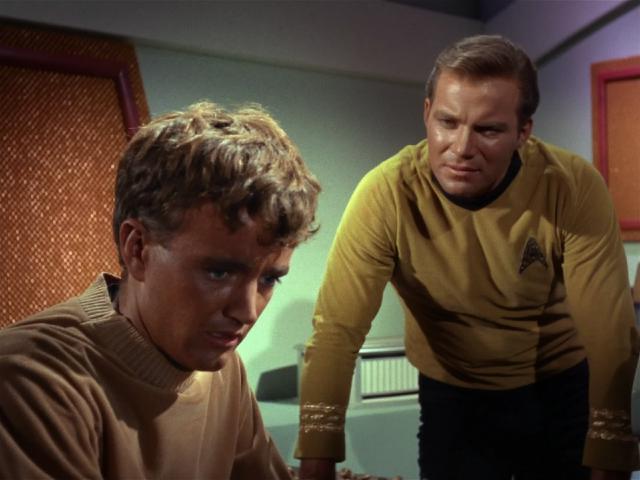
Review
So, the first episode of Star Trek was a monster-of-the-week horror story featuring a tragic villain and a melancholy ending. How did they follow that up in the second episode? With a monster-of-the-week horror story featuring a tragic villain and a melancholy ending. I can’t help but wonder what impression people had of Star Trek after seeing just these two episodes - they may have thought it was similar to contemporaries like The Twilight Zone or The Outer Limits, just with a persistent cast and setting. Surely it doesn’t help that the plot of “Charlie X” feels like a twist on the plot of “It’s a Good Life”, a highly-regarded episode of The Twilight Zone that had aired five years earlier.
But unlike “The Man Trap”, “Charlie X” doesn’t really live up to its premise’s potential even as a horror story. It is properly creepy straight away, with Robert Walker turning out an amazing performance as the human-yet-alien Charlie Evans who is by turns sympathetic and terrifying. But the story can’t quite decide on its throughline.
The episode’s dialog seems to position it as “What if an adolescent male had godlike powers?” (This is analogous to “It’s a Good Life”’s “What if a child had godlike powers?") But the story’s events are much more “What if someone who grew up alone without learning social skills, empathy, or moral responsibility and was very lonely had godlike powers?” Both questions have potential, but the two interfere with each other and neither is fully dealt with.
The main way in which Charlie’s adolescence is relevant is that he has a crush on Rand which is implied to be at least partially sexual in nature. But the reason he struggles to interact with Rand is the same reason he struggles to relate to everyone else in every other context: his complete lack of social development.
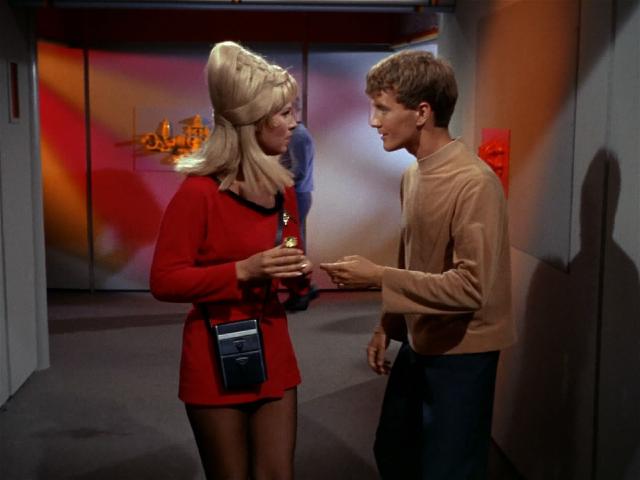
Kirk responds to this situation by treating Charlie as just another confused teenager and tries to teach him to fight. He doesn’t explain why he chooses this approach, but presumably it’s intended as a healthier outlet for Charlie’s frustration and a more socially-acceptable way to experience physical contact. (It feels like such a 1960s dad move.) This immediately fails due to Charlie’s complete lack of experience persevering through difficulty - and when a crewman laughs while Charlie is already frustrated and self-conscious, Charlie gets mad and disappears him right in front of Kirk.
Now, more than halfway through the episode, Kirk finally sees the threat that Charlie represents. But he doesn’t engage with Charlie as someone who doesn’t understand what he’s doing or why it’s wrong - he immediately tries to assert his dominance and intimidate Charlie into obedience, as though he sees Charlie as a rebellious teenager in need of structure and discipline. This results in the situation rapidly escalating and Charlie becoming radicalized. He quickly goes from trying to be likable to commandeering the ship and freely tormenting anyone who slights him (or whom he imagines slights him). There is no reasoning with Charlie once these lines have been crossed and the story is now about the crew trying to figure out how to deal with a powerful monster. The episode never really engages with the problem of a godlike teenager or a godlike person with no social or moral development, except to show that treating the latter as a normal teenager is probably not a good strategy.
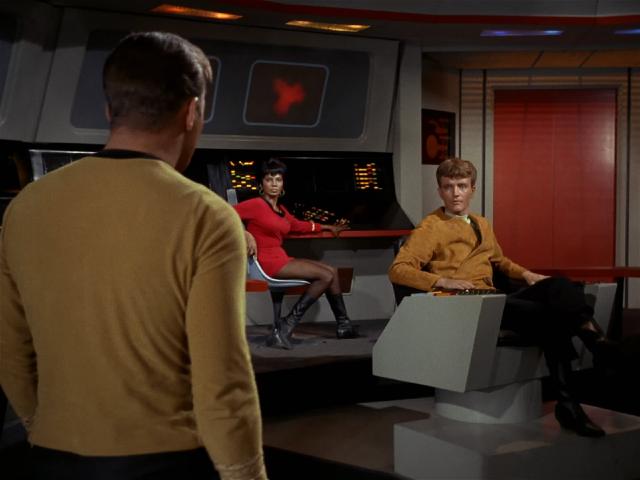
The ending then comes as a bit of a deus ex machina. The Thasians had been set up and are a good explanation for why Charlie has his powers, but their arrival comes mostly out of nowhere and renders irrelevant the events on the ship and Kirk’s plan to defeat Charlie by overextending his powers. The Thasians hit the reset button on all the havoc Charlie has wreaked on the Enterprise, though they cannot undo the destruction of the Antares and the offscreen death of its crew. They then take Charlie away, removing the problem entirely.
But even though Charlie has murdered twenty people (and terrorized more), this ending doesn’t feel like justice. Charlie is clearly not emotionally or socially mature and it’s equally clear that this is a consequence of his tragic circumstances rather than any fault of his own. When he pleads desperately to be allowed to stay with humans instead of the Thasians whom he cannot touch and who do not love, it doesn’t feel like a dastardly villain is about to receive their just deserts. Even Kirk is moved to argue that Charlie should be with his own kind.
The best outcome would be the Thasians removing Charlie’s powers and leaving him with the humans for rehabilitation, but no one even brings up this possibility. The closest is Kirk suggesting that Charlie could be trained not to use his powers (which the Thasian says is impossible) and then asking, “Is there nothing you can do?” In response, the Thasian says they can take Charlie away - and then does so, with Charlie’s chilling “I want to stay…” echoing as he disappears.
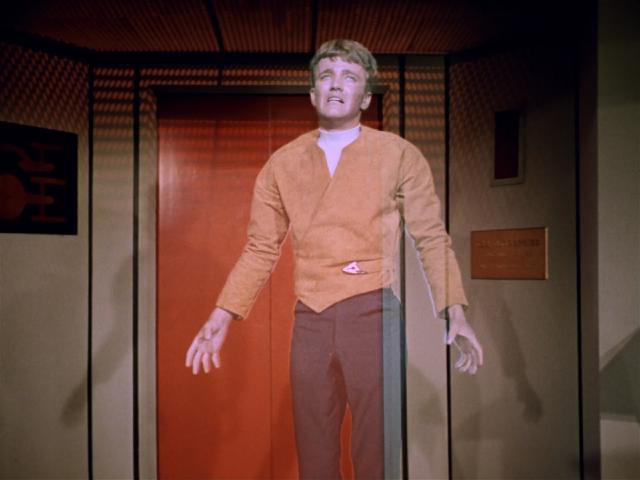
It’s hard to find anything satisfying about this ending. The crew don’t win through clever heroism. The status quo hasn’t been changed in any consequential way. Justice hasn’t been served. The lack of engagement with the premise’s apparent questions means there isn’t a clear takeaway or moral. We just felt sad for Charlie, then scared for the crew, and then sad for Charlie again, and now everything’s back to normal but nobody is happy and nothing was learned.
It’s dark, but also toothless - even viewed strictly as a horror story, it compares unfavorably to “It’s a Good Life” which engages better with its similar-but-less-conflicted premise and doesn’t need to pull its punches via a status quo reset at the end.
And so I can’t recommend this episode as either a starting point for Star Trek or as a horror story.
Assorted Observations
I find the crew’s treatment of Charlie frustrating through most of the episode. Right away they act like they haven’t been properly briefed on his situation (or like the lack-of-social-development angle was written in later and the rest of the script wasn’t fully updated to account for it, which could also explain the disjoint premise) and only McCoy is nice to him. They also just… let him wander around the ship with no escort, including letting him closely observe working crew members. Particularly strange is that Spock just walks away from him after beating him at chess (instead of asking about his suspicions about the Thasians) and that letting Charlie walk around freely and alone continues after his powers are discovered. At first, Kirk convinces him to go to his quarters, but then after summoning him to ask about the Antares and confirming that he destroyed it, they just let him walk away, resulting in him causing increasingly serious problems. It’s hard not to feel like the crew mismanaged the situation every step of the way and could have avoided most of the trouble with a bit more care.
The rec room scene is deeply strange, with Uhura singing a racist and sexist song about Spock having “Satan’s guise” and how “female astronauts” need “be wary” of him. Like her scene with him in “The Man Trap”, this seems likely to have been intended to show off Spock’s alien nature but today mostly reads as Uhura having a thing for Spock and being weird about it. And before you have a chance to wrap your head around this moment, Uhura sings a song teasing Charlie for being a virgin and having a crush on Rand. It hardly even seems worth pointing out Spock’s uncharacteristic grin during this scene compared with the incredibly rude and unprofessional behavior Uhura is displaying. I mostly just pretend this scene, in its entirety, never happened.
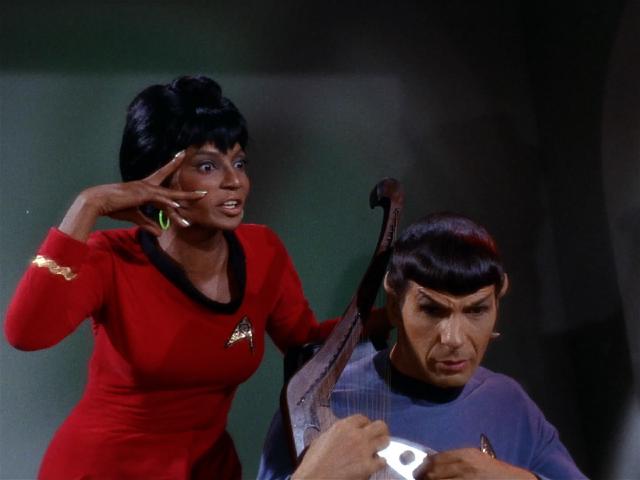
The establishing shots of the ship’s gymnasium are also distractingly goofy. With no lead-up, we are shown two men sparring with pugil sticks, a series of women tumbling in leotards, and then a shirtless Kirk falling onto a mat and pointing his rear at the camera. Only after this is there any dialog clarifying that Kirk has brought Charlie to the gym to teach him to wrestle.
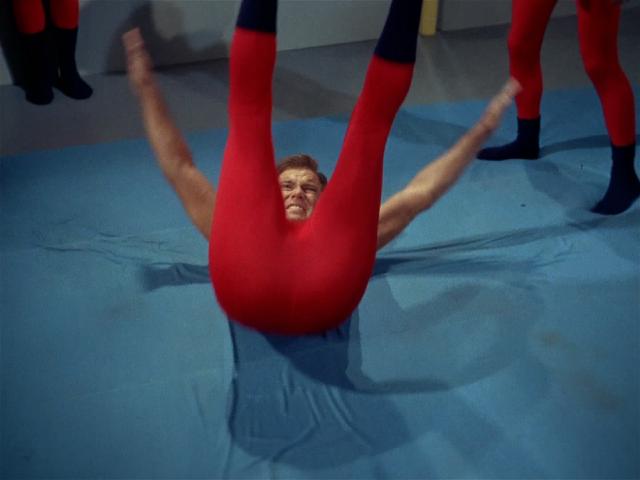
After the Antares is destroyed, Kirk makes a log entry noting that he has informed “UESPA headquarters” of the loss. That’s the United Earth Space Probe Agency - an early version of what the writers would eventually retcon into Starfleet. At this point in the series' production, neither Starfleet nor the Federation had been conceived of and any references to the Enterprise’s affiliation or origin suggest it is an Earth ship. Just pretend Kirk said “Starfleet command” here.
The episode does have a couple decent character-establishing scenes. Kirk, Spock, and McCoy discussing the legends of Thasians on the bridge and Spock accusing McCoy of thinking emotionally rather than logically for dismissing a hard-to-believe explanation for otherwise unaccountable evidence is a solid early example of the nature of their relationship. Similarly, Kirk beating Spock at chess (in the franchise’s first broadcast appearance of 3D chess) and Spock calling Kirk’s approach “illogical” and Kirk countering that it is “inspired” encapsulates their relationship and Kirk’s pattern of finding clever, unanticipated solutions to the problems he encounters.
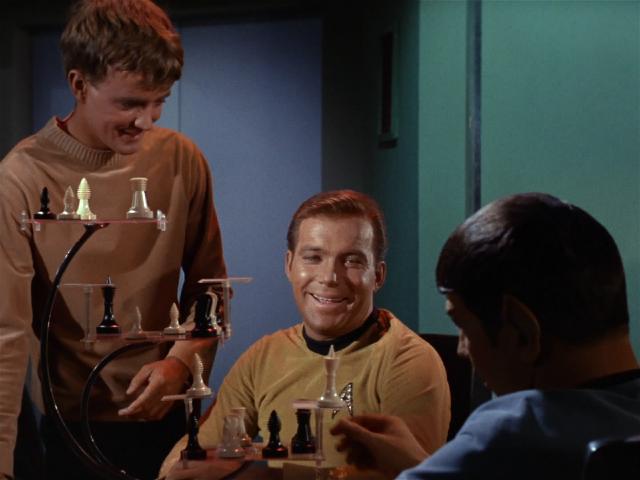
What’s disappointing about this latter example, though, is that in this episode it’s largely a case of telling rather than showing. It would land much more strongly if Kirk saved the day in the main plot through the use of illogical/inspired tactics. And he almost does. His plan to spread Charlie’s powers too thin such that he can safely distract Charlie while McCoy sedates him is clever and bold (and I love the way Spock and McCoy TURN ON ALL THE THINGS and then, in unison, turn and stare defiantly at Charlie - three times).
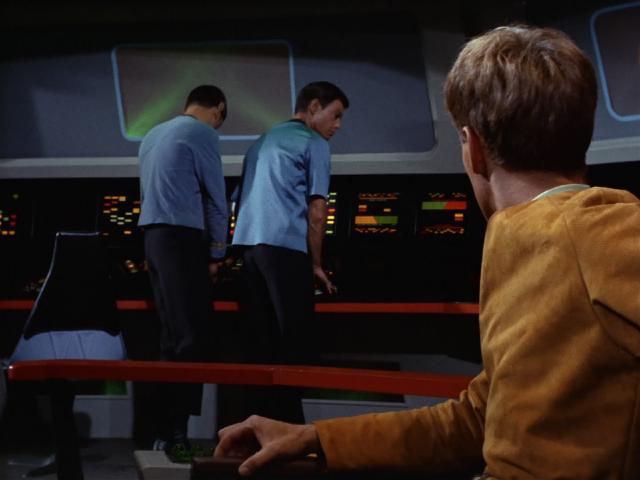
But then McCoy makes no move to sedate Charlie, and before the stalemate is resolved the Thasians show up and assume full control of the plot, leaving Kirk’s plan pointless.
Also, the Thasians quickly return Rand to the bridge - but only Rand. She’s one of several disappeared crew members, none of whom were disappeared from the bridge. Why is Rand brought back to the bridge and no one else? I suppose the Thasians read the show’s credits and realized that out of all the disappeared characters, she was the only one who was a recurring cast member and thus the only one worth caring about.